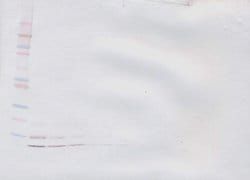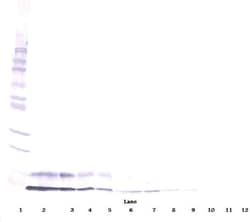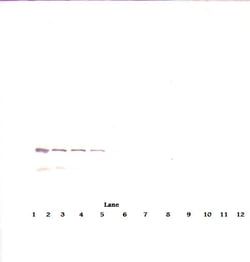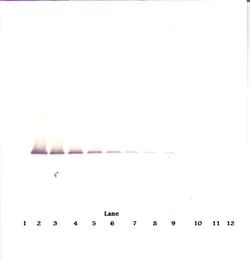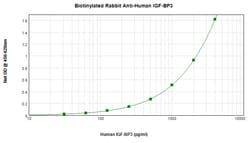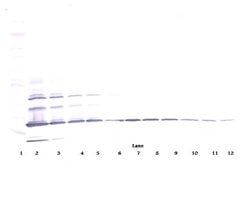IGF1 Polyclonal Antibody, Biotin, PeproTech®, Invitrogen™
Rabbit Polyclonal Antibody
Manufacturer: Fischer Scientific
The price for this product is unavailable. Please request a quote
Antigen
IGF1
Applications
ELISA, Western Blot
Conjugate
Biotin
Host Species
Rabbit
Target Species
Human
Gene Accession No.
P05019
Gene ID (Entrez)
3479
Immunogen
E.coli-derived Recombinant Human IGF-I
Purification Method
Antigen affinity chromatography
Gene
IGF1
Concentration
0.1-1.0 mg/mL
Classification
Polyclonal
Form
Lyophilized
Regulatory Status
RUO
Formulation
PBS with no preservative
Gene Alias
C730016P09Rik; class 1 insulin-like growth factor I preproprotein; class 2 insulin-like growth factor I preproprotein; H-IGF-1; IBP1; IGF; IGF1; Igf-1; IGF1A; IGFI; Igf-I; IGFIa; IGF-IA; IGF-IB; insulin growth factor-1; Insulin like growth factor; insulin like growth factor 1; insulin-like growth factor 1; insulin-like growth factor 1 (somatomedin C); insulin-like growth factor I; insulin-like growth factor I (somatomedin C); insulin-like growth factor IB; mechano growth factor; MGF; M-IGF-1; OTTHUMP00000195084; prepro-IGF-I; prepro-insulin-like growth factor I; R-IGF-1; somatomedin; Somatomedin C; Somatomedin-C
Gene Symbols
IGF1
Primary or Secondary
Primary
Content And Storage
-20°C
Description
- AA Sequence of recombinant protein: GPETLCGAEL VDALQFVCGD RGFYFNKPTG YGSSSRRAPQ TGIVDECCFR SCDLRRLEMY CAPLKPAKSA
- Preparation: Produced from sera of rabbits immunized with highly pure Recombinant Human IGF-I
- Anti-Human IGF-I-specific antibody was purified by affinity chromatography and then biotinylated
- Sandwich ELISA: To detect Human IGF-I by sandwich ELISA (using 100 μL/well antibody solution) a concentration of 0.25-1.0 μg/mL of this antibody is required
- This biotinylated polyclonal antibody, in conjunction with PeproTech Polyclonal Anti-Human IGF-I (500-P11) as a capture antibody, allows the detection of at least 0.2-0.4 ng/well of Recombinant Human IGF-I
- Western Blot: To detect hIGF-I by Western Blot analysis this antibody can be used at a concentration of 0.1-0.2 μg/mL
- Used in conjunction with compatible secondary reagents the detection limit for Recombinant hIGF-I is 1.5-3.0 ng/lane, under either reducing or non-reducing conditions
- 500-P11BT-1MG will be provided as 2 x 500 μg IGF1 (Insulin-like growth factor-1) is structurally and functionally related to insulin but has a much higher growth-promoting activity
- A variety of cellular responses are induced by IGF1, including cell proliferation, differentiation, migration, and survival
- Further, IGF1 is a polypeptide growth factor that stimulates the proliferation of a wide range of cell types in muscle, bone, and cartilage tissue
- IGF1 stimulates glucose transport in rat bone-derived osteoblastic (PyMS) cells and is effective at much lower concentrations than insulin, not only regarding glycogen and DNA synthesis but also with regards to enhancing glucose uptake
- In circulation, IGFs are predominantly bound to binding proteins (IGFBPs) which prolong the half-life of the IGFs and play a role in delivering them to target tissues
- IGF-I is known as one of the most potent activators of the AKT signaling pathway which is known to be a stimulator of proliferation and an inhibitor of programmed cell death
- Moreover, mature human IGF-I is 100% homologous with bovine and porcine proteins
- Low levels of IGF1 have been linked to Alzheimer's disease
- IGF1 is processed from a precursor, bound by a specific receptor, and secreted
- Defects in the IGF1 gene are a cause of insulin-like growth factor 1 deficiency and several transcript variants encoding different isoforms have been found.
